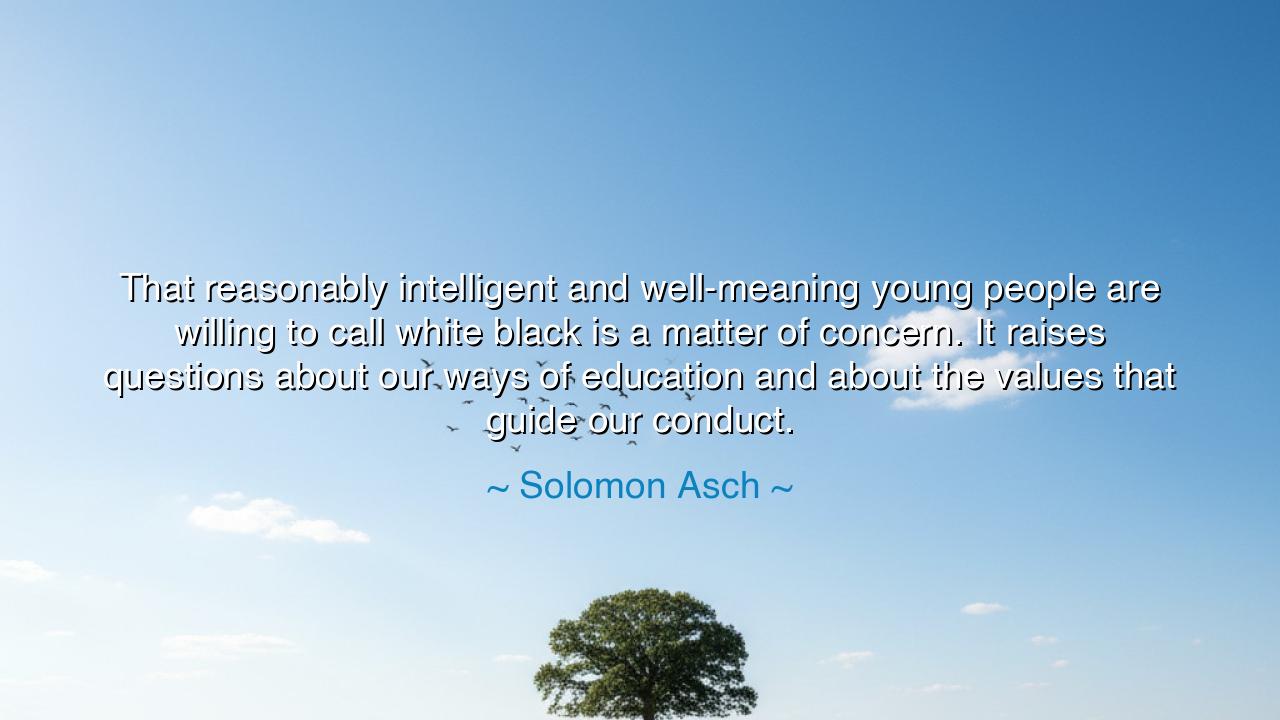
That reasonably intelligent and well-meaning young people are
That reasonably intelligent and well-meaning young people are willing to call white black is a matter of concern. It raises questions about our ways of education and about the values that guide our conduct.






The words of Solomon Asch, though born from the realm of psychology, carry the weight of an ancient oracle. When he warned that “reasonably intelligent and well-meaning young people are willing to call white black,” he was not merely describing a study, but lamenting the peril of the human spirit when truth is surrendered to conformity. This quote speaks of a great tragedy: that the mind, noble and capable of reason, may bow before the pressure of the crowd, and in doing so, abandon the light of truth for the comfort of belonging. It is a warning to every age, and especially to ours, that intelligence without courage becomes a fragile reed, bending with every wind of opinion.
In the mid-twentieth century, Asch conducted his famous experiments in conformity, where young men, seeing clearly that one line was longer than another, nonetheless agreed with the false judgment of the group. They knew the truth—and yet they denied it. Why? Because to stand apart is painful. The fear of rejection can dull the sharpness of reason. Thus, the quote reminds us that education, when it trains only the mind but not the spirit, fails its highest purpose. To know what is right is nothing; to stand for what is right, even when alone, is the true test of wisdom.
Think of the ages past. Socrates, that old lover of truth, drank the poison rather than betray the dictates of his conscience. In his defiance, he became a monument to intellectual integrity. Yet in every crowd that condemned him, there were likely those “reasonably intelligent and well-meaning” souls who knew he was right—but were silent. They, too, called white black, not from malice, but from fear. Their hearts were not evil, but untrained in courage. Here lies the very meaning of Asch’s lament: education that shapes the mind but leaves the moral backbone untempered breeds clever slaves, not free thinkers.
The story repeats through time. In the dark days of the Third Reich, countless Germans—educated, cultured, even kind—accepted what they knew in their hearts was false. They called cruelty duty, and oppression order. Their obedience became complicity. Few were monsters; most were simply afraid to stand alone. Thus, Asch’s warning is no mere academic observation—it is a cry for the preservation of conscience in an age of conformity. When the crowd roars, and truth becomes inconvenient, the soul must learn to be its own compass.
And yet, my friends, let us not despise the weakness of humanity, for each of us carries within the same trembling heart. It is easy to think we would resist, that we would speak the truth boldly when others fall silent. But the power of social influence lies not in evil but in belonging, in the primal desire to be accepted. Therefore, we must train our hearts as warriors of truth, daily practicing the small acts of honesty, the quiet refusals, the gentle but firm words that guard our integrity. For no man becomes brave suddenly in the hour of trial; he must have walked long in the discipline of truth.
Let the lesson, then, be this: Never trade truth for comfort, nor integrity for approval. Seek education not only of the mind but of the soul. Learn to question, even when the crowd mocks. Teach your children to love what is right more than what is popular. Surround yourself with those who value sincerity over flattery. And when you find yourself standing alone for the truth, know that you are in the company of the greatest spirits of all ages.
Thus, Asch’s warning becomes a call to arms—not with swords or shields, but with courage and conscience. To live rightly in a world that rewards conformity is to live heroically. For every generation faces its own trial, and the question remains the same: Will we call white black, or will we bear the burden of truth? Let us answer, not with trembling, but with resolve—that the light of integrity shall not be dimmed by the shadow of fear.






AAdministratorAdministrator
Welcome, honored guests. Please leave a comment, we will respond soon